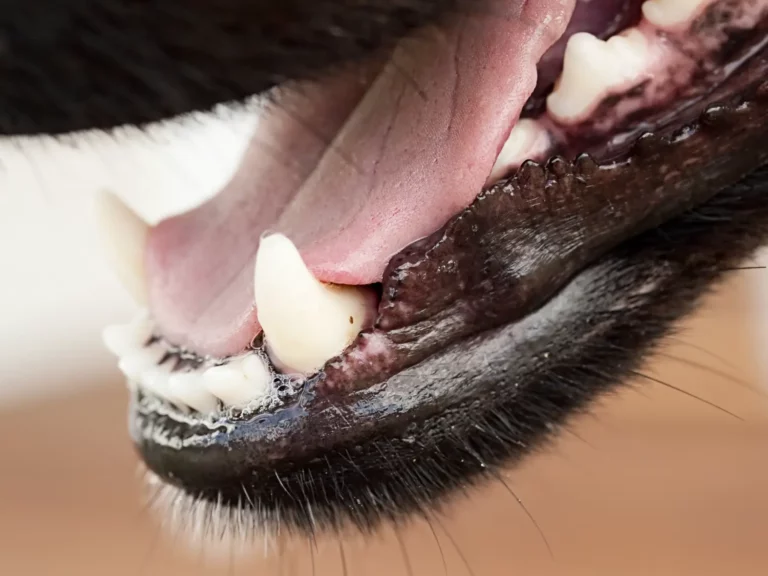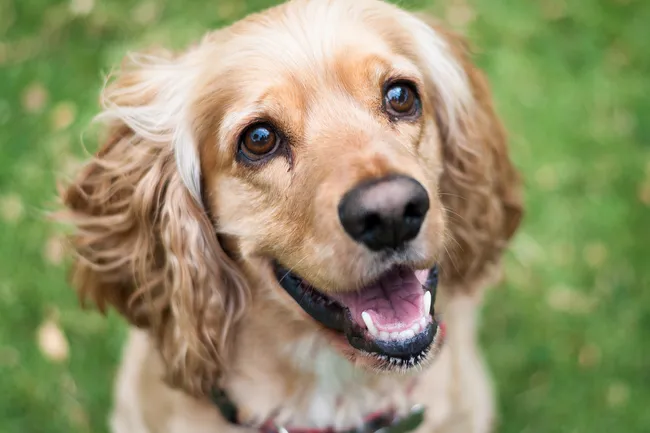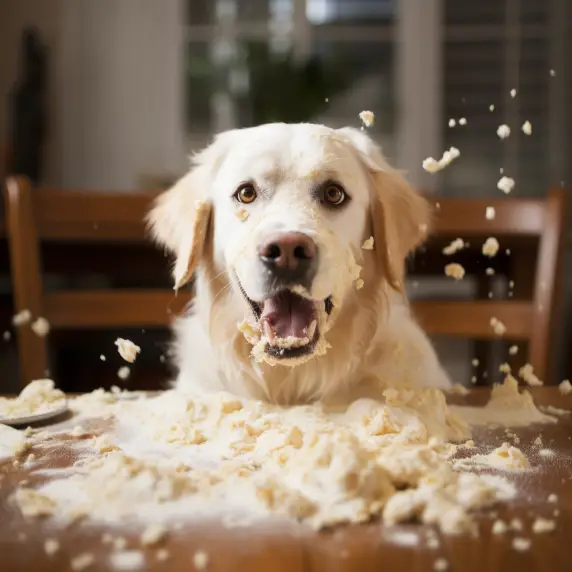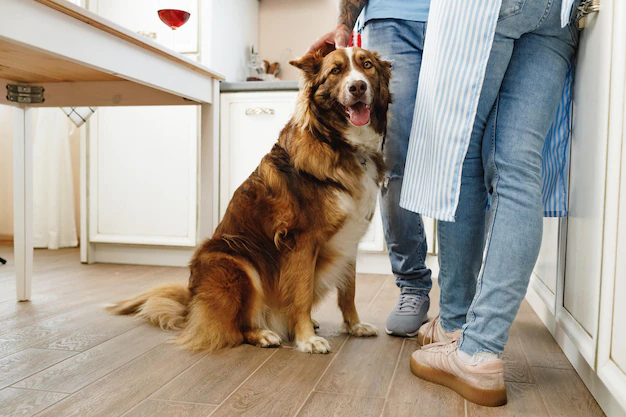Exploring Why Dogs Eat Geese Poop and How to Stop It
If you’ve ever taken your dog for a walk near a pond or lake, chances are you’ve encountered the bizarre behavior of your furry friend eating goose poop. It might be surprising, even shocking, but it’s a relatively common occurrence among dogs.
Many dog owners have faced this perplexing situation and are left wondering why their beloved pets are attracted to something as unappealing as goose droppings. Understanding the reasons behind this behavior is crucial not only for your peace of mind but also for the well-being of your dog.
This article explores the reasons why dogs are drawn to goose poop, the potential risks associated with this habit, and the steps you can take to keep your dog safe and healthy. So, let’s delve into the mystery of dogs eating goose poop and learn how we can better care for our canine companions!
Why Do Dogs Eat Geese Poop?
Dogs have been known to exhibit some peculiar eating habits, and their fondness for geese poop is no exception. While the behavior may seem repulsive to us, there are several possible reasons why dogs engage in this behavior.
One theory is that dogs are attracted to the strong smell of geese poop. Since dogs have a highly developed sense of smell, they may find the scent appealing and enticing. Additionally, the texture and taste of the feces may also play a role in the dog’s desire to consume it.
Some dogs may simply find the act of scavenging and eating geese poop to be an exciting and rewarding activity.
Another possible explanation is that dogs eat geese poop as a means of seeking nutrients that may be lacking in their diet. Geese have a different diet than dogs, and their feces may contain undigested food particles that are rich in nutrients.
Dogs, being opportunistic eaters, may instinctively consume geese poop as a way to supplement their nutritional needs.
Despite these theories, the exact reasons behind why dogs eat geese poop may vary from one individual to another. It’s important to remember that each dog is unique, and their behavior may be influenced by a combination of factors such as genetics, environment, and past experiences.
Now that we have explored some possible reasons for this behavior, let’s take a closer look at the risks associated with dogs eating geese poop.
The role of a dog’s powerful sense of smell
Dogs have an incredibly strong sense of smell, which is about 10,000 to 100,000 times more powerful than that of humans. This heightened olfactory ability allows them to detect the various scents present in goose poop, including any undigested food particles and pheromones.
Dogs are often attracted to strong-smelling substances, which may explain their interest in goose droppings. The distinct smell of the feces can pique their curiosity, leading them to investigate and even consume it.
The natural curiosity of dogs
Dogs are inherently curious creatures that love to explore their surroundings. They use their senses, particularly their sense of smell, to learn more about the world around them. This innate curiosity is essential for their survival, as it helps them identify food sources, potential threats, and mates.
When dogs come across goose poop, their curiosity might drive them to give it a sniff, taste, or even eat it. This behavior doesn’t necessarily mean that they find it delicious; it’s just their way of satisfying their curiosity and gathering information about their environment.
Nutritional aspects
Although it may seem repulsive to us, goose poop can contain traces of undigested food particles that might be appealing to dogs.
Geese are herbivores, and their droppings can contain remnants of grass, seeds, and other plant material that might be interesting to a dog, especially if they’re not getting all the necessary nutrients from their diet.
In some cases, a dog’s attraction to goose poop could be a sign that their diet is lacking in specific nutrients. Ensuring that your dog has a balanced and nutritious diet can help reduce their interest in consuming such unusual items.
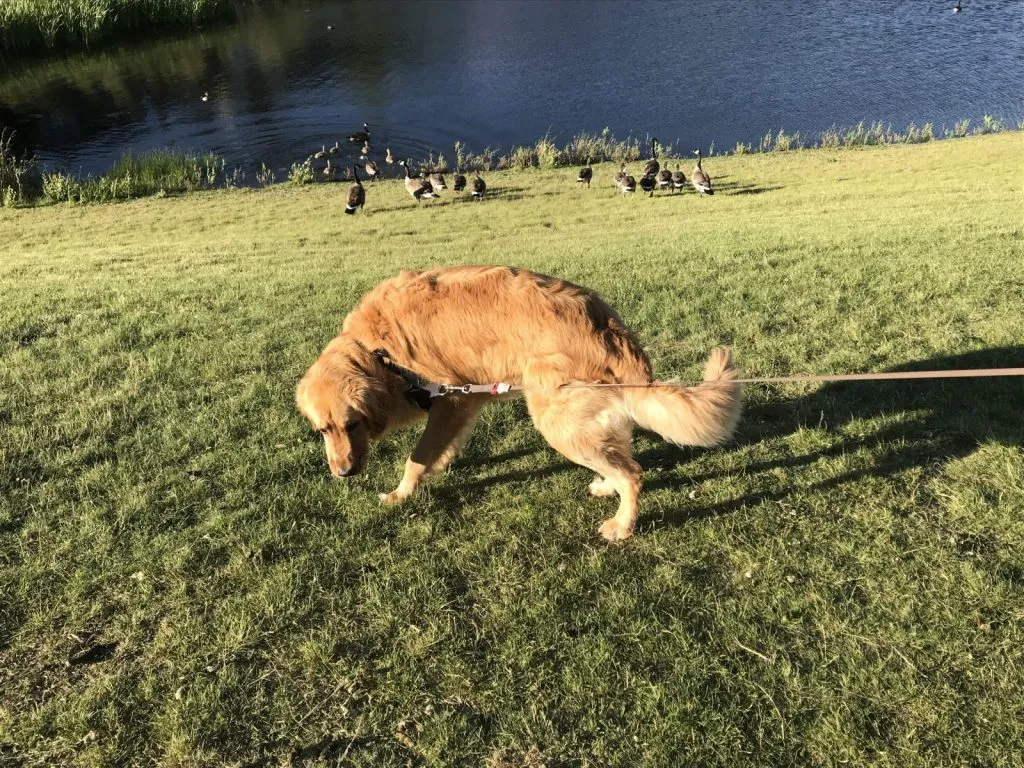
The Risks of Eating Goose Poop
Bacterial infections
Goose droppings can harbor a variety of harmful bacteria, such as Salmonella, E. coli, and Campylobacter, among others. When dogs consume goose poop, they might inadvertently ingest these bacteria, putting them at risk for infection.
Ingesting harmful bacteria can lead to gastrointestinal issues in dogs, such as vomiting, diarrhea, and loss of appetite. In more severe cases, it could also result in fever, lethargy, and dehydration. If you notice any of these symptoms in your dog after they’ve eaten goose poop, it’s crucial to consult your veterinarian for proper treatment.
Parasites
Goose droppings can also be a source of various parasites, including Giardia and Cryptosporidium. These parasites can infect a dog’s gastrointestinal tract, causing symptoms similar to those of bacterial infections, like diarrhea, vomiting, and weight loss.
If left untreated, parasitic infections can cause severe health issues in dogs and may even be fatal. It’s essential to be vigilant for any signs of infection in your dog after they’ve consumed goose poop and seek veterinary care if necessary.
Toxicity
Geese often reside near bodies of water, which can sometimes be polluted with toxic substances such as pesticides, heavy metals, and harmful chemicals. These toxins can accumulate in goose poop, posing a risk to dogs that consume it.
Ingesting toxins can lead to various health problems in dogs, depending on the type and amount of toxin consumed. Symptoms can range from mild gastrointestinal upset to more severe issues like kidney or liver damage. If you suspect your dog has ingested a toxic substance from eating goose poop, it’s vital to contact your veterinarian immediately.
How to Prevent Dogs from Eating Geese Poop
Training and obedience
Teaching your dog the “leave it” command can be an invaluable tool in preventing them from eating goose poop. This command tells your dog to ignore whatever they’re focused on and look to you for guidance. With consistent training and reinforcement, your dog will learn to resist the temptation to eat goose droppings.
Positive reinforcement is essential in training your dog to avoid undesirable behaviors. Whenever your dog successfully obeys the “leave it” command, reward them with praise, affection, or a treat. This will help to reinforce the desired behavior and make it more likely that they’ll avoid eating goose poop in the future.
Environmental management
One of the simplest ways to prevent your dog from eating goose poop is to avoid areas with high concentrations of droppings. If you know that a particular park or walking path is frequented by geese, consider finding an alternative route for your daily walks.
Keeping a close eye on your dog during walks is crucial for their safety. Always have them on a leash and maintain control, especially in areas where goose poop is present. This will allow you to intervene and redirect your dog’s attention if they show interest in the droppings.
Diet and nutrition
Ensuring your dog receives a balanced and nutritious diet is key to minimizing their attraction to goose poop. Consult your veterinarian for guidance on the appropriate food and portion sizes for your dog, considering factors like age, size, and activity level.
Providing high-quality dog food with all the necessary nutrients will not only keep your dog healthy but also help to curb their curiosity for unusual food sources like goose droppings.
Additionally, offering your dog safe and engaging chew toys can help to satisfy their natural urge to chew and explore without resorting to eating goose poop.
How to React if Your Dog Eats Goose Poop
Immediate actions
If you catch your dog eating goose poop, it’s essential to monitor them closely for any signs of illness. Keep an eye out for symptoms such as vomiting, diarrhea, lethargy, or loss of appetite, as these could indicate an infection or the presence of parasites.
If your dog exhibits any concerning symptoms, don’t hesitate to contact your veterinarian for advice and appropriate treatment. Prompt intervention can help to minimize the potential health risks associated with consuming goose poop.
Long-term prevention
If your dog has already eaten goose poop, take this as an opportunity to revisit your training techniques and reinforce the “leave it” command. Consistent and patient training will help your dog develop better impulse control and avoid consuming goose droppings in the future.
Evaluate your dog’s diet to ensure they’re receiving all the necessary nutrients. If you suspect that nutritional deficiencies might be driving their interest in goose poop, consult your veterinarian for recommendations on adjusting their diet.
A well-balanced diet can play a significant role in preventing your dog from seeking out unusual food sources like goose droppings.
Frequently Asked Questions
Can eating goose poop cause my dog to vomit or have diarrhea?
Yes, ingesting goose poop can lead to gastrointestinal issues such as vomiting and diarrhea in dogs.
How long should I monitor my dog for signs of illness after they eat goose poop?
It is recommended to monitor your dog for at least 24 to 48 hours after ingestion for any signs of illness.
Can a dog’s breed or size make them more prone to eating goose poop?
No, there is no evidence to suggest that specific breeds or sizes of dogs are more likely to eat goose poop.
Is there any way to remove the smell of goose poop from my dog’s breath?
Regular dental care, including brushing your dog’s teeth and using dental chews or toys, can help to remove unpleasant odors from your dog’s breath.
Final Thoughts
We’ve explored the reasons why dogs are attracted to goose poop, such as their powerful sense of smell, natural curiosity, and potential nutritional aspects. We’ve also discussed the potential health risks associated with this behavior, including bacterial infections, parasites, and toxicity.
Understanding and addressing this behavior is crucial for keeping your dog safe and healthy. By employing strategies like training, environmental management, and proper nutrition, you can minimize your dog’s interest in consuming goose droppings and reduce the risk of potential health issues.
As a responsible dog owner, it’s essential to be proactive in caring for your canine companion. By educating yourself about the reasons behind your dog’s fascination with goose poop and taking the necessary precautions, you can ensure that your dog stays happy, healthy, and safe.

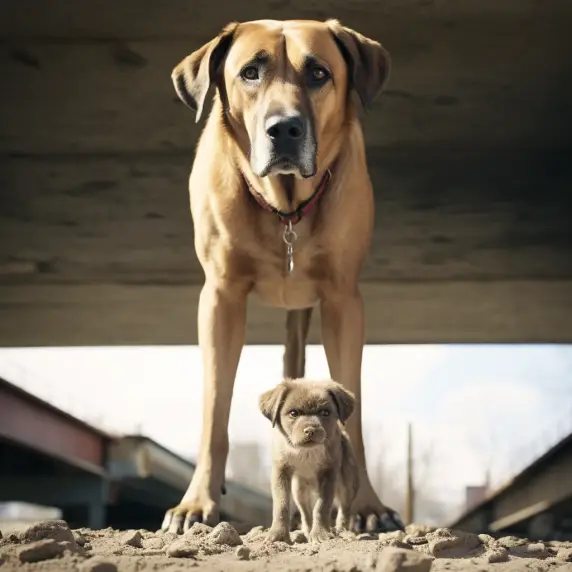
![Why is My Dog Panting at Night? [4 Reasons]](https://www.warmlypet.com/wp-content/uploads/2022/12/why-is-my-dog-panting-at-night-768x513.webp)
